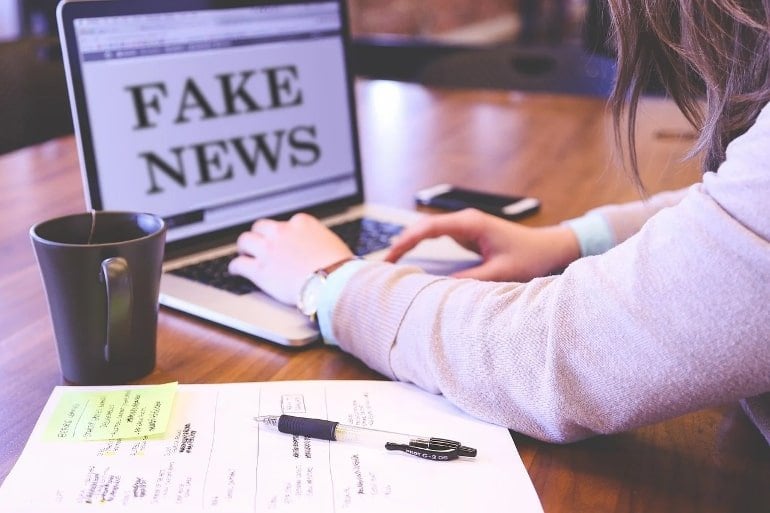Summary: Study reveals those who score low in the personality trait of conscientiousness are more likely to share misinformation or fake news.
Source: Duke University
From rumored vaccine risks to the fatal misuse of ivermectin, misinformation has posed significant obstacles in the battle against COVID-19.
Although warning labels on content have proven to dissuade people from sharing so-called “fake news,” that’s not true for all. New research from Duke University’s Fuqua School of Business identifies a specific personality type that is not only more likely to share misinformation, and is not deterred from sharing it even after being warned it might be false.
The study, published in the Journal of Experimental Psychology: General, showed participants with liberal and conservative political beliefs both shared erroneous news stories to a certain degree. But conservatives who also scored low on conscientiousness engaged in such behavior to a greater extent – they were more likely than liberals or more conscientious conservatives to share misleading information, the research found.
Conscientiousness refers to a person’s propensity to be diligent, reliable, dutiful, cautious, control their impulses and follow social norms, said senior author Hemant Kakkar.
The goal of the research is to provide deeper understanding and much-needed nuance in light of more than a dozen studies since 2018 that have concluded that, in general, conservatives are more likely than liberals to believe and share misinformation, Kakkar said.
“Political polarization is very high right now, so the existing research presents a problematic generalization,” said Kakkar, whose research focuses on management and organizations. “If we paint every conservative with the same broad brush, we’re just furthering political polarization. In this research, we argue that the effects are much more nuanced and limited to a small subset of people with conservative values.”
Across eight studies with more than 4,600 participants, Kakkar and co-author Asher Lawson, a Fuqua Ph.D. student, explored numerous factors that might lead people to share misinformation, even after being warned it might be false. The research showed conscientiousness plays a significant role.
Conscientiousness is one of five traits that comprise personality, according to the widely cited “Big Five” theory in psychology originating in the 1980s. The Big Five has been used to investigate topics from how people function in work teams to a person’s susceptibility to Alzheimer’s Disease. To determine conscientiousness, participants completed a 60-item questionnaire that measured this trait on a seven-point scale.

To the researchers’ surprise, the data showed those conservatives who shared misinformation did so regardless of how much time they spent on social media, whether they supported the ideas in the falsified story, or even because they were trying to align their support with a particular political figure, Kakkar said. The analysis found participants who shared erroneous reports were driven by a desire to create chaos, he said.
“We were shocked to see this had nothing to do even with a distrust for mainstream media,” Kakkar said. “It had more to do with their dissatisfaction with current political and social institutions, and a desire to break those down in favor of anarchy.”
“Unfortunately, this desire is not assuaged even when the participant saw a warning that the story they were sharing may be false. So one critical question for the future is if there’s anything that can help reduce this behavior, maybe by addressing these individuals’ desire for chaos.”
The researchers hope the public will take away a specific message from the findings — that a combination of personality and political beliefs — not just political beliefs — influences whether people perpetuate false information.
“Conscientiousness appears to be a truly important factor determining the relationship between a person’s political ideology and whether they share disinformation,” Lawson said. “That behavior almost completely disappeared in people with higher levels of conscientiousness.”
About this psychology and personality research news
Author: Samiha Khanna
Source: Duke University
Contact: Samiha Khanna – Duke University
Image: The image is in the public domain
Original Research: Closed access.
“Of pandemics, politics, and personality: The role of conscientiousness and political ideology in the sharing of fake news” by Hemant Kakkar et al. Journal of Experimental Psychology: General
Abstract
Of pandemics, politics, and personality: The role of conscientiousness and political ideology in the sharing of fake news
Sharing misinformation can be catastrophic, especially during times of national importance. Typically studied in political contexts, the sharing of fake news has been positively linked with conservative political ideology. However, such sweeping generalizations run the risk of increasing already rampant political polarization.
We offer a more nuanced account by proposing that the sharing of fake news is largely driven by low conscientiousness conservatives. At high levels of conscientiousness there is no difference between liberals and conservatives.
We find support for our hypotheses in the contexts of COVID-19, political, and neutral news across eight studies (six preregistered; two conceptual replications) with 4,642 participants and 91,144 unique participant-news observations. A general desire for chaos explains the interactive effect of political ideology and conscientiousness on the sharing of fake news. Furthermore, our findings indicate the inadequacy of fact-checker interventions to deter the spread of fake news.
This underscores the challenges associated with tackling fake news, especially during a crisis like COVID-19 where misinformation impairs the ability of governments to curtail the pandemic.







